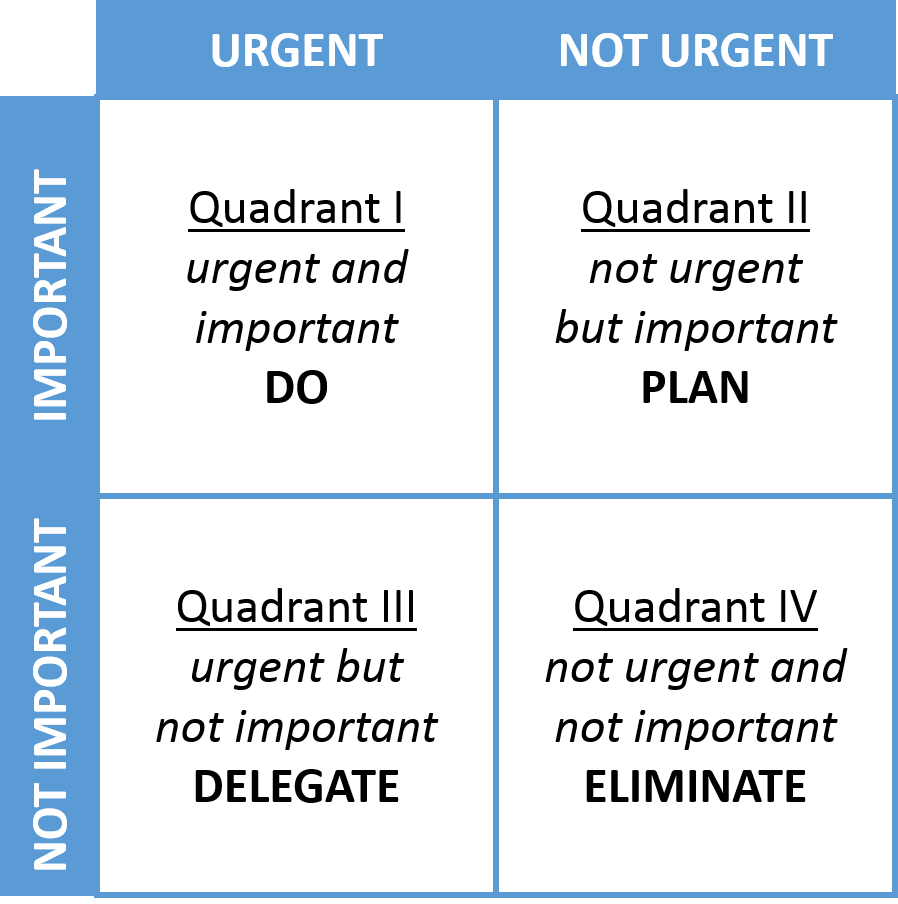The urgent and the important

One of the biggest lessons I have learned so far as a department chair is the importance of differentiating between tasks that are important, and things that are urgent. As former US President Dwight D. Eisenhower once said:
I have two kinds of problems: the urgent and the important. The urgent are not important, and the important are never urgent.
The difference between the important and the urgent can be vast. Urgent items are always focused on the present moment: They need attention right now and if they are not dealt with, the consequences also happen right now. Important items on the other hand belong to long-term goals and items of strategic value. They are "slower", connected to a long game of personal or professional or organizational development.
We tend to give our attention to urgent tasks at the expense of important tasks. Urgent tasks come in hot into our inboxes and scream loudly for resolution. They are, in David Allen's terms, the "latest and loudest". They are almost always someone else's problem, given to us on a short time frame that amplifies their volume. So naturally we focus on those first. Sometimes this is the right thing to do. But it becomes a serious problem when we are only dealing with the urgent and not giving adequate time to the important things that sit there, quietly and patiently.
In becoming a department chair, the single biggest adjustment I've had to make is in the amount of effort needed to decide whether something is urgent or important, and exercising the discipline to give attention to things that are important but not urgent. The amount of work that I have to do hasn't really changed that much before versus after becoming a department chair; it's the nature of the work that's changed, and the most prominent facet of that change is that the first step is to parse out what items, of the dozens that appear on my doorstep every day, are urgent versus important.
Almost everything that comes into my inbox sounds urgent. Most of these urgent requests matter and have value, and probably all of these items are important to the person making the request. But are they capital-"I" Important in the sense of pertaining to long-term goals and strategies for myself or the department? Sometimes they are; many times they are not. Telling the difference, and triaging the urgent stuff while also making time for the important stuff (which almost never shows up in my email inbox, curiously), is probably the biggest and most crucial part of my work now.
Here are some tasks from my current actions lists that are Important (capital "I"):
- Read an article about a local university's redesign of a math course that's similar to one we need to redesign. (Important because redesigning this course is a 3-year goal for the department.)
- Study the setup of my university's digital badge on Workplace Technology and Communication. (Important because introducing digital badges is going to be a major curricular initiative in the next few years university-wide and I want to make sure the Math Department is leading in this area.)
- Write a draft of the unit recommendation for a faculty member up for promotion. (Important because it's a promotion, and helping faculty grow professionally is a long-term strategic goal for me professionally and one of my core duties as department chair.)
Eisenhower famously differentiated between the urgent and the important, and a popular productivity hack about this bears his name: The Eisenhower Matrix.

In this 2x2 matrix we can plot the tasks that are urgent but not important; important but not urgent; both important and urgent; or neither important nor urgent. And we can rank the priority of those items and get a sense of what to do with them by where they fall in the matrix:
- Tasks that are urgent and important are the highest priority and should be done ASAP. They are automatic candidates for the Most Important Thing (MIT) list for a given day.
- Thasks that are important but not urgent come second. These need to be done; schedule time during the week to do them.
- Tasks that are urgent but not important are third. Delegate these if possible. Otherwise schedule time for them, but not at the expense of the important stuff.
- Tasks that are neither urgent nor important get whatever time is left over. If it's a personal or just-for-fun item, usually I do that sort of thing on the weekends or evenings[1]. If not, then these items probably need to be re-processed using the GTD flowchart because they are no longer truly actionable (or never were in the first place) and need to be trashed, delegated, or put into a someday/maybe list.
For example, suppose I get an email from a student who's having trouble with their professor and wants an appointment this week. I need to act on this, but it is not something I would categorize as strategically important in the sense of serving a long-term goal. So it's "urgent but not important[2]". I'll probably delegate this by telling the student to set up an appointment with me through our office staff.
Reading the article about the course redesign is important, but not urgent --- schedule one pomodoro during the week to read and take notes on it, and get it done this week. The professor's unit recommendation for Promotion happens to be due on Friday, so this is both urgent and important --- that's an MIT on my list for tomorrow and has a two-hour block in my calendar tomorrow morning all by itself.
I've found myself thinking a lot about the Eisenhower matrix since becoming department chair. Before, I could often get away with dealing with only urgent things for several days in a row while putting off Important items for later. (Always "later".) Now, 90% of the items in my inbox on a daily basis demand to be heard as Urgent, and dealing with them all right now would require more than 168 hours in a week. It turns out that about half of those items on average are not even actionable, and so they get trashed, delegated, or put into a someday/maybe list. For the ones that remain, I have tags for Urgent and Important in my GTD setup so I can filter out tasks based on their quadrant in this matrix. Important tasks get time boxes through the week or at least part of a single pomodoro. As for the rest, I get to them when I get to them (or delegate them). And you know what? Things still get done, and the world doesn't collapse in on itself. And I feel a lot better at the end of the day about what I'm doing.
What's at stake if we fail to distinguish between urgent and important tasks? Everything, really. Being at the mercy of the latest-and-loudest is no way to live --- you're constantly putting out fires but never building anything, constantly dealing with other people's problems but never developing your professional self, slowly burning out from all the stress and never doing the things you know will be fulfilling.
Some formulations of the Eisenhower matrix approach, like the one in the picture, tell you to trash neither-urgent-nor-important items on sight. But I think some of the best things in life fall into this category. They just don't have priority scheduling (except on the weekends). ↩︎
To clarify for those in the back: If I say something is "not important" this doesn't mean I don't care about it or that it doesn't matter. ↩︎


